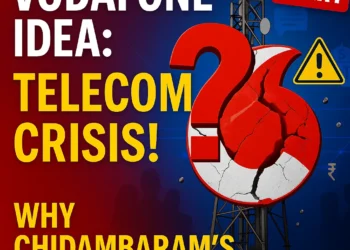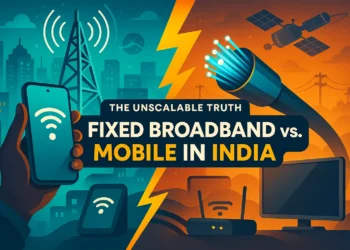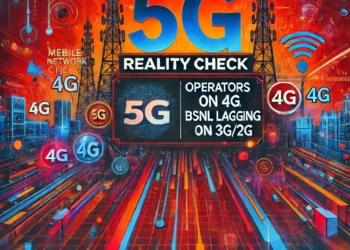Following the recent tariff hikes, many individuals in the affordable segment have gravitated toward BSNL connections, resulting in a significant migration of subscribers from other mobile operators. According to TRAI’s subscription report, between July 2024 and October 2024, BSNL added 6.8 million wireless subscribers, while Vodafone lost an identical number. Meanwhile, Bharti Airtel and Jio gained 3.6 million and 16.5 million subscribers, respectively, reflecting a trend of SIM consolidation.
Despite this influx, many subscribers who switched to BSNL have expressed dissatisfaction due to poor service quality and persistent network issues. This article aims to systematically examine why BSNL’s 4G network performance remains subpar, despite the government’s claim—made in response to a parliamentary question—of spending ₹1.33 lakh crore out of the total ₹2.28 lakh crore revival package and deploying 61,492 4G sites as of December 6, 2024.







Dear Parag
I just read the article . The figure of 4G BTSs by BSNL as on 6 December is correct. The assumption that BSNL has decommissioned 2G/3G BTSs is not correct. Also assumption that BSNL is only using 2100MHz is not correct. BSNL is using both low and mid band.The concern about 700 MHz use for 4G and migration to 5G has some value..but Pl note Airtel / VI is not using 700MHz for 5G, BSNL may follow similar path for 5G in lower band. Whats your comment!!!
Dear Ashok,
Let’s break this down logically:
BSNL has 70K sites, so deploying 62K 4G BTS implies most of these sites must be utilized (at least one BTS per frequency band) to maintain or maximize coverage. Otherwise, coverage will shrink. While 2G remains active, NOT decommissioning 3G limits their 4G options to the 700 MHz or 2500 MHz bands. If they’re using 2500 MHz, coverage will be far worse than it is now. This suggests their 4G deployment is primarily in the 700 MHz or 2100 MHz bands, as they lack 1800 MHz, and 900 MHz is dedicated to GSM. Crucially, deploying in 2100 MHz would require pulling down 3G operations currently using that band.
If all 62K BTS were deployed on 700 MHz, the quality of coverage would be significantly better. This raises questions: is the 62K figure inflated, or are most of these BTS deployed in 2100 MHz (with only some in 700 MHz)? The numbers don’t seem to add up otherwise.
5G Migration Concerns
If BSNL uses both 700 MHz and 2100 MHz for 4G, they’re left with only the 3500 MHz band for 5G. Contrast this with Airtel, which uses 3500 MHz and 1800 MHz for 5G and is likely to add 900 MHz in many circles (where they have 10 MHz+ holdings, and BSNL just have 6.2 MHz in 900 MHz which can’t be repurposed without pulling 2G down). Airtel’s 4G continues on portions of 1800 MHz and 3500 MHz, while their 5G spans 900 MHz, 3500 MHz, and even 600 MHz where 900 MHz isn’t available. Similarly, VI leverages significant 900 MHz spectrum in key circles for flexibility.
BSNL doesn’t have this flexibility. They can’t vacate 900 MHz, and achieving decent 4G quality and coverage requires both 700 MHz and 2100 MHz. This creates a serious 5G migration bottleneck unless:
The government opens the 600 MHz band (which lacks a device ecosystem and will take time to mature), or
BSNL repurposes the underutilized 800 MHz band (e.g., deploying at least 5 MHz in many regions).
The Alternative
Why not deploy 4G using a combination of 800 MHz and 2100 MHz, leaving 700 MHz exclusively for 5G? This approach avoids the high costs and limited ecosystem of 700 MHz devices in the affordable segment. Wouldn’t this strategy make more sense?
Regards,
Author
Superb Analysis Sir, Just read your article but I think , 800 MHz 4G band is already sold out to Jio in all 22 circles. You are missing another point BSNL Broadband/Wireless net etc is based on 3G network only. BSNL is still hesitant to remove 3G network completely because they don’t want to disappoint BSNL Broadband users because they are still using 3G Modems. Especially in some areas After launching 4G they are not removing 3G network completely. Phone is always shifting between 3G & 4G and this will frustrate users more and makes them to lose their trust in BSNL. BSNL will rapidly lose users and they will port to other private stable networks like Jio, Airtel, Vi. Total internet mobile user base shift to 5G will take another 5 years. BSNL will remain as intentionally loss making company and after VRS 2.0 employees will be fired and finally BSNL will be auctioned and sold to Adani. BSNL will be renamed as Adani Network 5G+6G and beyond in future…… BSNL will remain as “Very Unstable Poor Network”and TRAI will remain as “Puppet of Private Telecom” in Indian Telecom History.
Note: This is just my opinion, I’m not here to defame Adani because he bought some spectrum.
Thanks
Update: Sir, I complained & requested to BSNL through Customer Care and BSNL self-care App about dismantling 3G network in area where 4G is launched. BSNL employees contacted me and asked me to wait for 1 to 2 months as national wide 4G network deployment is under process. After 3 weeks they removed 3G network in my area and 4G is working properly. I observed one thing they are responding more to typed complaint through BSNL self-care App. If you contact through calling customer care your call may connect immediately or you have to wait for 20 to 30 minutes based on traffic. Slowly BSNL will also increase tariffs with increase in it’s network coverage & quality. I think with in a year upcoming affordable 4G & 5G smart phones under 10000 rupees will surely support 700MHz 4G & 5G band of BSNL. Finally BSNL problem solving response is slow but it will surely solve all complaints of BSNL and we have to be very optimistic & patient. In my previous comment, I was very frustrated and reacted according to my knowledge of daily news updates about BSNL. I think, after national wide BSNL 4G launch, Jio,Airtel & Vi will lose their users due to their aggressive ARPU greed.
Note: This is just my opinion. I’m not here to defame Jio, Airtel & Vi.
Sir can you please tell me what complaint youd did and what you writen in complaint…. because i also want to complaint about same issue my network switching between 3g and 4g and i don’t get proper network.
Nishant Sir, Just install and login to “BSNL Selfcare”app and raise a complaint and don’t mention your specific address like door number etc.,.. instead type a complaint like this “Unstable network in Area name, Village name, Sub-district, District – Pincode, phone always shifts between 3G & 4G, shutdown 3G network with in a month or I will my PORT my number to another network, and I will tell my BSNL user friends about this.” End of complaint, your complaint will be raised and tracking number will be issued to you. They will respond to your complaint within two weeks. They will call you to not PORT to other network then explain your problem clearly. They will tell you time period like one month or two months. Be patient and wait, They will resolve issue. If not solved in mentioned time then PORT to other network. One more thing before doing all of this once check whether your device supports 700 MHz 4G band which is very essential for indoor coverage. If not then buy a new budget mobile which supports multiple 4G,5G bands.
BSNL net problem